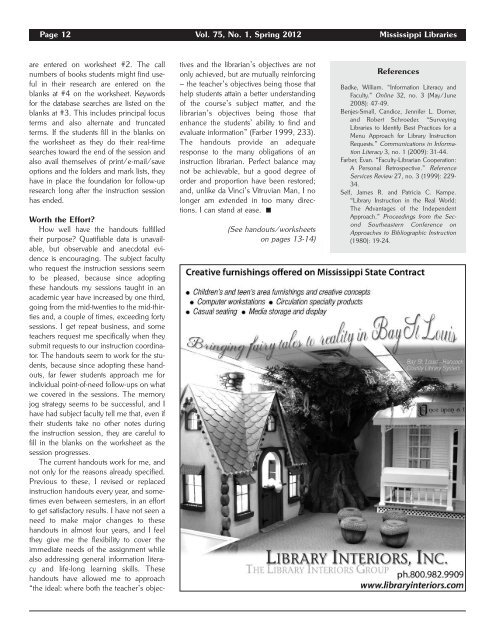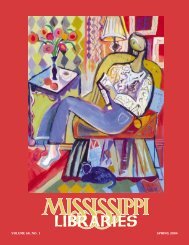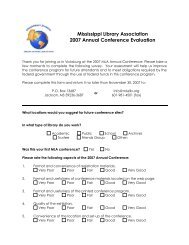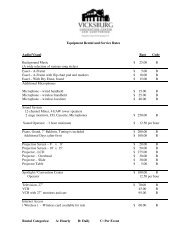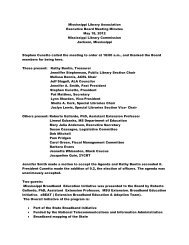Full Text (PDF) - Mississippi Library Association
Full Text (PDF) - Mississippi Library Association
Full Text (PDF) - Mississippi Library Association
You also want an ePaper? Increase the reach of your titles
YUMPU automatically turns print PDFs into web optimized ePapers that Google loves.
Page 12 Vol. 75, No. 1, Spring 2012 <strong>Mississippi</strong> Libraries<br />
are entered on worksheet #2. The call<br />
numbers of books students might find useful<br />
in their research are entered on the<br />
blanks at #4 on the worksheet. Keywords<br />
for the database searches are listed on the<br />
blanks at #3. This includes principal focus<br />
terms and also alternate and truncated<br />
terms. If the students fill in the blanks on<br />
the worksheet as they do their real-time<br />
searches toward the end of the session and<br />
also avail themselves of print/e-mail/save<br />
options and the folders and mark lists, they<br />
have in place the foundation for follow-up<br />
research long after the instruction session<br />
has ended.<br />
Worth the Effort<br />
How well have the handouts fulfilled<br />
their purpose Quatifiable data is unavailable,<br />
but observable and anecdotal evidence<br />
is encouraging. The subject faculty<br />
who request the instruction sessions seem<br />
to be pleased, because since adopting<br />
these handouts my sessions taught in an<br />
academic year have increased by one third,<br />
going from the mid-twenties to the mid-thirties<br />
and, a couple of times, exceeding forty<br />
sessions. I get repeat business, and some<br />
teachers request me specifically when they<br />
submit requests to our instruction coordinator.<br />
The handouts seem to work for the students,<br />
because since adopting these handouts,<br />
far fewer students approach me for<br />
individual point-of-need follow-ups on what<br />
we covered in the sessions. The memory<br />
jog strategy seems to be successful, and I<br />
have had subject faculty tell me that, even if<br />
their students take no other notes during<br />
the instruction session, they are careful to<br />
fill in the blanks on the worksheet as the<br />
session progresses.<br />
The current handouts work for me, and<br />
not only for the reasons already specified.<br />
Previous to these, I revised or replaced<br />
instruction handouts every year, and sometimes<br />
even between semesters, in an effort<br />
to get satisfactory results. I have not seen a<br />
need to make major changes to these<br />
handouts in almost four years, and I feel<br />
they give me the flexibility to cover the<br />
immediate needs of the assignment while<br />
also addressing general information literacy<br />
and life-long learning skills. These<br />
handouts have allowed me to approach<br />
“the ideal: where both the teacher’s objectives<br />
and the librarian’s objectives are not<br />
only achieved, but are mutually reinforcing<br />
– the teacher’s objectives being those that<br />
help students attain a better understanding<br />
of the course’s subject matter, and the<br />
librarian’s objectives being those that<br />
enhance the students’ ability to find and<br />
evaluate information” (Farber 1999, 233).<br />
The handouts provide an adequate<br />
response to the many obligations of an<br />
instruction librarian. Perfect balance may<br />
not be achievable, but a good degree of<br />
order and proportion have been restored;<br />
and, unlike da Vinci’s Vitruvian Man, I no<br />
longer am extended in too many directions.<br />
I can stand at ease. <br />
(See handouts/worksheets<br />
on pages 13-14)<br />
References<br />
Badke, William. “Information Literacy and<br />
Faculty.” Online 32, no. 3 (May/June<br />
2008): 47-49.<br />
Benjes-Small, Candice, Jennifer L. Dorner,<br />
and Robert Schroeder. “Surveying<br />
Libraries to Identify Best Practices for a<br />
Menu Approach for <strong>Library</strong> Instruction<br />
Requests.” Communications in Information<br />
Literacy 3, no. 1 (2009): 31-44.<br />
Farber, Evan. “Faculty-Librarian Cooperation:<br />
A Personal Retrospective.” Reference<br />
Services Review 27, no. 3 (1999): 229-<br />
34.<br />
Self, James R. and Patricia C. Kampe.<br />
“<strong>Library</strong> Instruction in the Real World:<br />
The Advantages of the Independent<br />
Approach.” Proceedings from the Second<br />
Southeastern Conference on<br />
Approaches to Bibliographic Instruction<br />
(1980): 19-24.


